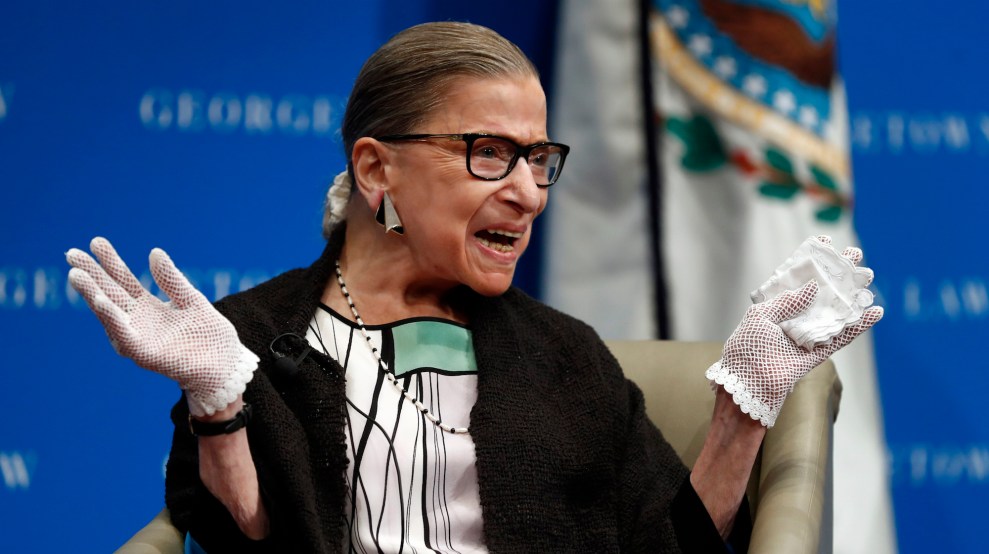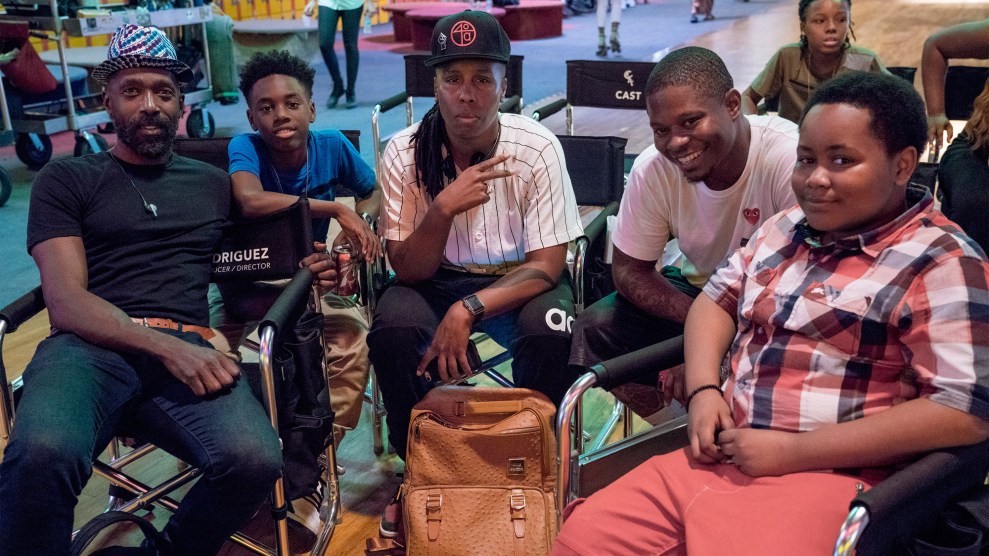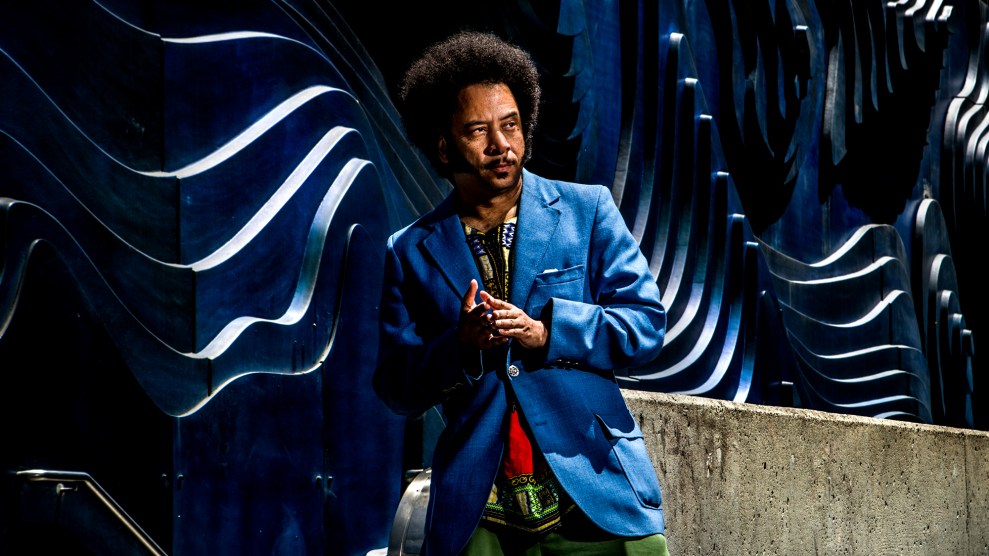
Christie Hemm Klok
An hour before showtime at a mid-April premiere of Sorry to Bother You at Oakland’s Grand Lake Theatre, moviegoers were already lined up down the block on either side of the marquee. “What’s this for?” asked a passerby. “Star Wars,” someone joked.
Inside the historic theater, sporting a ’70s-era navy blue suit, Raymond “Boots” Riley, first-time director and longtime frontman for eclectic hip-hop group the Coup, came out to introduce his film, which hits theaters July 6 and is shaping up to be a success story in the vein of Jordan Peele’s Get Out. The showing was part of the San Francisco International Film Festival, which hadn’t used the Grand Lake before this year, but Riley had insisted. He saw Star Wars here as a kid—“the real one”—not to mention the 1985 Krush Groove premiere: “Sheila E. was like right there.”
Riley, 47, has been a visible icon of East Bay culture and activism for such a long time that it’s hard to imagine he wasn’t born with his trademark Afro and muttonchops. Sorry to Bother You, like Riley’s music, functions as a portal into his revolutionary worldview, wherein artists and working families and people of color struggle against gentrification, greedy landlords, diabolical corporations, and a rigged, racist, rapacious capitalist system protected by thuggish cops and bought politicians. Riley’s coup, so to speak, is that he has managed to package these ideas into a film that’s fast-paced, funny, and refreshingly weird.
“Y’all should see the shit I turn down,” actor Terry Crews, who plays the protagonist’s uncle, told the Grand Lake crowd. “For every movie I do, there’s like 20 things I’m like, ‘Nope. Nope. Nope.’ Because you look at these scripts and you’re like, ‘It’s the same movie.’ Not here. When I read this script, I was like, ‘Oh my God! What’s happening next?’ When I closed it, I said, ‘Oh my god. If I don’t do this, I’ll be making the biggest mistake of my life!’”
Set in Oakland, Sorry to Bother You was inspired by Riley’s stints as a telemarketer during film school at San Francisco State University—he dropped out after landing a record deal—and later between Coup albums. “I always had some sort of sales job from the time I was 11. I was the kid knocking on your door selling subscriptions, saying, ‘I need one more subscription to get to Disneyland,’” he told me. “I became, for the wrong reasons, good at listening to people—to figure out how to sell them stuff.”
His political sensibility wasn’t always an easy sell. The Coup, which pairs elements of funk, punk, and hip-hop with Riley’s provocative rhymes, has released six studio albums over the past quarter century with titles such as Kill My Landlord, Genocide & Juice, and Steal This Album. In November 2001, the group released Party Music, a collection of astute bangers that garnered glowing reviews—and 15 minutes of notoriety once word got out that the original, unpublished CD cover had Boots and the late DJ Pam Warren (a.k.a. Pam the Funkstress) blowing up the World Trade Center. The art was hastily redesigned after 9/11 to depict a flaming martini glass—a literal Molotov cocktail.
Violent metaphors aside (Party Music includes “5 Million Ways to Kill a CEO”), Riley’s oft-humorous lyrics evoke a keen sense of community and a desire for the downtrodden to rise up to better their lot. Yet despite ample critical acclaim, the Coup never became a household name—lamentably, in Riley’s view. “The goal has always been to get these ideas, this art, out to as many people as possible,” he says. “It’s never been about being the ‘in’ crowd, being the hip ones.”
Back in 2011, when he started writing Sorry to Bother You, Riley figured he’d play the lead. He completed a draft the following year and released an eponymous Coup album, touring it to generate interest. That didn’t work. By 2014, the movie was still a script—but what a script! “It didn’t read like any screenplay I’d ever read,” says novelist Dave Eggers, who read it reluctantly after bumping into Riley on the street one day. “Boots’ script was hysterically funny on the page and really savage in its satire, and just sort of built momentum and power as it went. He was broaching issues that nobody really does in American film. And it wasn’t leaden and preachy. He has that ability to talk about deadly serious things but never forgetting that he has to entertain, too.” Eggers ended up publishing the screenplay as a paperback on his McSweeney’s imprint.
I meet up with Riley the day after the Grand Lake showing for a late lunch in San Francisco’s Chinatown. He’s traded the suit for black jeans, black sneakers, and a gray-green hoodie over a yellow T-shirt. A leather sheath containing an angel food cake cutter, which Riley deploys as an Afro pick, dangles over his right back pocket. The after-party kept him up until 3 a.m. and he was awake four hours later getting his son Nicos to school. (Riley has three sons and a daughter, ranging in age from 5 to 21.) When I comment that he must be exhausted, he says he can hardly remember when he wasn’t. Writing and directing this film was a longtime dream, but also a slog he likens to making stone soup: “It really was just a war of inches.”
One by one, Riley convinced others to read the script and sign on. Comedian David Cross dug it, as did Patton Oswalt, who in a 2016 interview called Riley “the closest thing hip-hop has to a Sarah Silverman or a Dave Chappelle.” British director Richard Ayoade had a look, too. “He was like, ‘Not only will I not direct this, but I’m going to insist nobody else should direct this but you,’” Riley recalls. It was that obvious. Before long, Riley had a filmmaker-in-residence position with SFFILM, followed by writing and directing fellowships with the Sundance Institute.
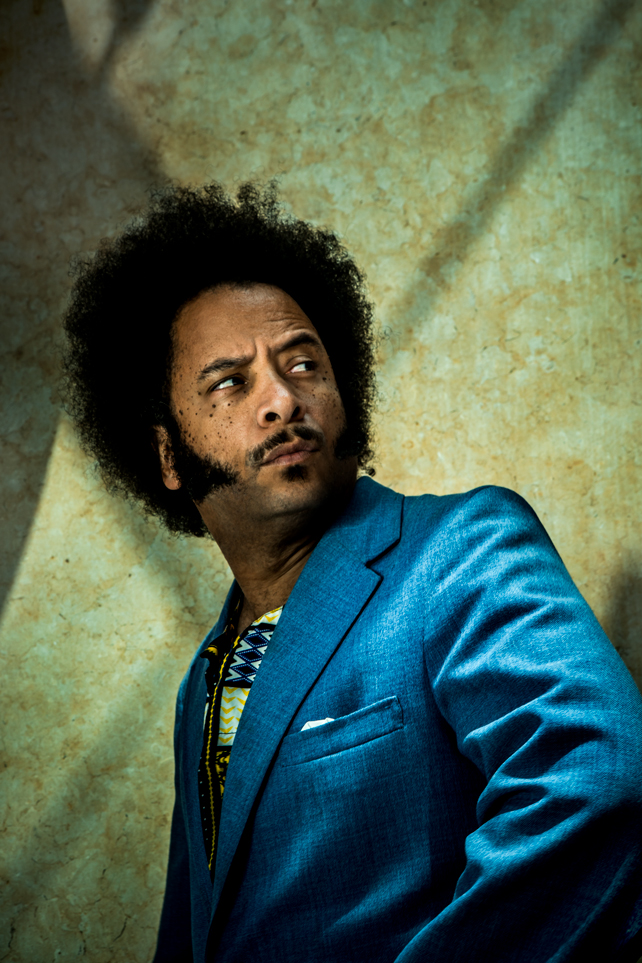
From these humble beginnings, Sorry to Bother You, produced for less than $5 million, has evolved into a star-studded affair. Riley’s young, black, broke protagonist, Cassius Green (Lakeith Stanfield), lands a gig in a telemarketing sweatshop where an ambitious salesperson, workers are told, can join the elite “power callers” who ascend to their swank top-floor offices in a private elevator. After a fellow cubicle dweller (Danny Glover) teaches him to summon his surreal “white voice,” Cassius is on his way. Now he’s got to choose between supporting his striking co-workers—including his artist girlfriend (Tessa Thompson)—and getting rich selling slave labor on behalf of WorryFree Corp., whose CEO (Armie Hammer) promises the rabble three meals a day and prisonlike housing in exchange for lives of unpaid toil. And then things really get crazy.
Riley came to political activism on his own, but it’s fair to say he was born into it. His father, Oakland attorney Walter Riley, was raised in segregated Durham, North Carolina, where he took part in lunch counter sit-ins and voter registration drives and eventually became a field secretary for the Congress of Racial Equality. During the 1960s, at San Francisco State University, Walter protested the Vietnam War as a member of Students for a Democratic Society, and became a leader in the Progressive Labor Party. He moved his family to Chicago in 1970—Raymond was born the following year, the fourth of five siblings. “Raymond was always very gentle and I think very sensitive,” Walter recalls. “He would not fight with other kids about their toys. But he wouldn’t let anybody take advantage of him, either.”
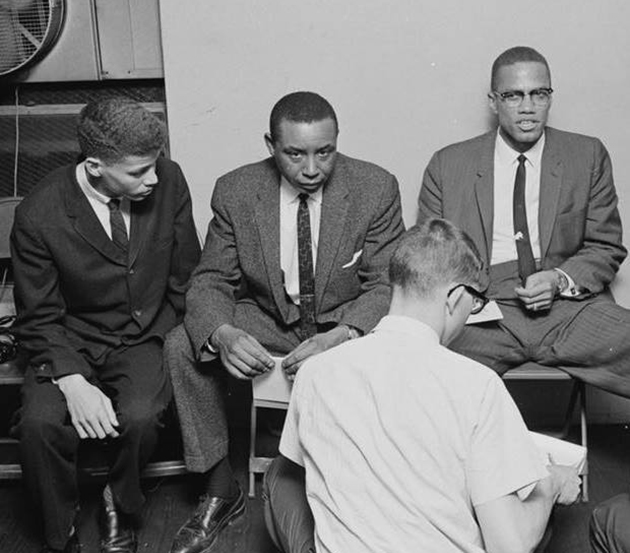
Courtesy of Walter Riley
The family relocated to Detroit, where Walter was paid to organize autoworkers—Riley remembers his dad coming home one day with bandaged ribs after a brawl with Klan members. But it wasn’t as though he were indoctrinated. “I never really even knew what their politics were,” he says. “I’d see flyers and stickers, and there’d be meetings at my house, but as a kid you’re not paying attention. [My dad] was never like, ‘Let me tell you how the world works.’ That’s the only reason I got politicized. If it was his thing, I wouldn’t be able to find my place in it.”
He found his place during high school, after a friend of his father asked for his help with a strike in the farm country south of Silicon Valley. By then, Riley’s parents had split. His mom had taken a job in Saudi Arabia and Walter was raising him and his little brother, Manuel, in East Oakland, relying on welfare checks while working toward a law degree at Golden Gate University. “They were both latchkey kids,” Walter told me. “Raymond was responsible for Manuel. I placed a lot of responsibility on Raymond, and I regret that.”
In any case, Boots—who got his stage name by wearing new dress boots on an Oakland High School trip and found his hip-hop voice while writing a rap version of West Side Story for the school’s theater program—agreed to assist his dad’s friend. He didn’t intend to follow through, but then the guy showed up one weekend morning with a van full of high school girls: “He said, ‘We’re all going to the beach, but first we’re going to go to the Watsonville cannery workers strike and support them. You want to go?’” Riley could hardly refuse. “I get in the van, and they’re talking about things that are going on in the world like they care about it. Like they know enough about these things to carry on conversations and have opinions!” He spent that summer working with a union to help farmworkers rally for better pay and conditions.
In the years since, Riley has toggled between music and activism. In the mid-1990s, he was part of the Young Comrades, a group that battled Oakland’s racially fraught “no cruising” law. He later recruited fellow rappers for “guerrilla hip-hop concerts” opposing California’s Proposition 21, which mandated harsh criminal penalties for young offenders. (It passed anyway.) He was also a prominent voice in Oakland’s Occupy movement. All of these things, Riley says, helped prepare him to direct his first motion picture. “Being involved in political campaigns and getting a band to work together, putting together tours and things like that, you have to know how to keep things going even though people are assholes,” he says. “I mean, like, Occupy, we’re figuring out what to do while smoke bombs are being hurled at us. I’m just saying, nothing’s going to be that crazy. So you’re making this movie and stuff is going wrong and it’s stressful. You’ve been through this before.”
After lunch, as we head toward the BART station to catch a train back to Oakland, Riley talks about why he’s optimistic his film will appeal to the mass audience that eluded the Coup. With the release date months away, the trailer has racked up more than 23 million views—he hears people are applauding it in theaters. And his distributor is planning heavy promotion, he says: “They actually think it could be, like, a blockbuster hit!”
At the corner of Jackson and Kearny streets, Riley excuses himself. He wants to go “bum-rush” Francis Ford Coppola. The great man’s offices are just a block away in the copper-green Cafe Zoetrope building. Riley isn’t certain he’ll get an audience, but he might as well try. Back in 1969, “him and George Lucas moved to San Francisco because they wanted to be part of a radical movement,” he says. “They wanted to make a radical film company. That’s why it’s called American Zoetrope—like, it’s a revolution. I’m making the kind of movie he thought he was going to make.”
Listen to rapper-turned-director Boots Riley talk to MoJo’s Jamilah King about his debut film, Sorry to Bother You, for this special Fourth of July episode of the Mother Jones Podcast:

